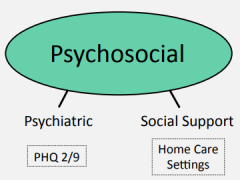Geriatrics
Clinical Skills | Psychosocial
Psychosocial Domain

This Domain includes assessing our patients' mood and social support. An appreciation of how these aspects of their lives allows for a deeper understanding and care in their overall health.
- Psychiatric: Mood disorders are common in later life and may cause loss of function. The PHQ2 may be used to screen for depression
- - PHQ2: The Patient Health Questionnaire 2 asks 2 questions to screen for depression, and if positive, should be followed by the full PHQ9.
- - Geriatric Depression Scale (GDS): The GDS is another questionnaire that asks patients to respond in a Yes/No format to assess for depression.
- - Hallucinations: Asking if a patient has any auditory or visual hallucinations may help with diagnosis of delirium, dementia (I.e. Lewy Body Dementia) and schizophrenia.
- Drugs and Sex: Often overlooked, but asking about any substance abuse (I.e. Alcohol, marijuana, etc) and sexual activities may lead to discovery of significant comorbidities. For example:
- - High risk sexual behavior -> HIV or syphilis leading to dementia
- IV drug use -> hepatitis C, HIV, etc.
- Elder abuse/neglect: Often overlooked, but as our aging population depends more and more on caregivers and family support, neglect, financial and physical abuse become more prevalent
- Any encounters require mandatory reports to the State
- Social support: The following are common living situations
- Home: This is the most common. Some individuals live alone or with family +/- caregiver
- Assisted living facility (ALF): Usually an apartment-style facility where individuals have varying degrees of independence. Generally, ALFs provide help with IADLs like cooking and cleaning
- Board and Care (B&C): Similar services like assisted living facilities, but usually in a home setting. A common scenario is 4-6 residents living in a house, cared for by 1-2 caregivers.
- Skilled nursing facility (SNF): These facilities provide skilled nursing needs, such as rehabilitation (PT/OT), IV antibiotics, wound care. Medicare will pay completely for the first 20 days and then 80% of the cost as there is a skilled need. If there is no longer a skilled need or the individual has reached “plateau” with therapy, the cost is usually out of pocket afterwards. The benefit period resets if there is a readmission for a different need or diagnosis after a 60-day break.
- How much does it all cost? National median 2019 (variable depending on state and region. Visit the Genworth Cost of Care Survey to learn more.)
- Home health aid: $4385/month or ~$20/hr
- Adult day care: $1625/month or ~$80/day
- Assisted living facility: $4051/month
- Semi-private nursing home: $7513/month
- Private nursing home room: $8517/month
- variable depending on state and region. Visit the Genworth Cost of Care Survey to learn more.
- California state median in 2017
- Home health aid: $157/day = $4767/month
- Adult day care: $77/day = $1668/month
- Assisted living facility: $141/day = $4275/month
- Semi-private nursing home: $267day = $8114/month
- Private nursing home room: $319/day = $9703/month